初三语法复习
- 格式:doc
- 大小:331.50 KB
- 文档页数:38
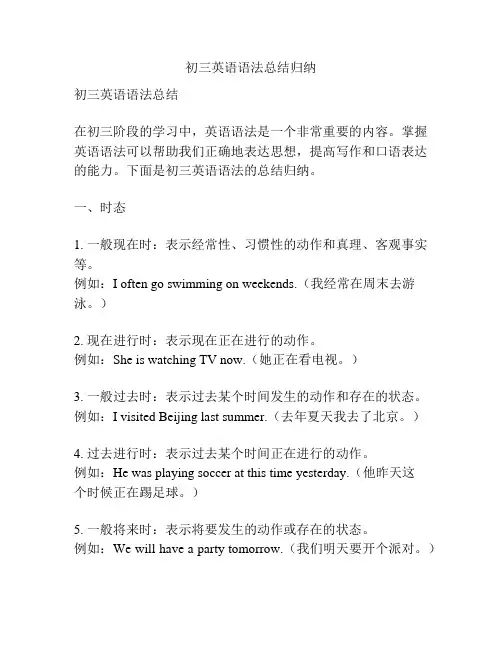
初三英语语法总结归纳初三英语语法总结在初三阶段的学习中,英语语法是一个非常重要的内容。
掌握英语语法可以帮助我们正确地表达思想,提高写作和口语表达的能力。
下面是初三英语语法的总结归纳。
一、时态1. 一般现在时:表示经常性、习惯性的动作和真理、客观事实等。
例如:I often go swimming on weekends.(我经常在周末去游泳。
)2. 现在进行时:表示现在正在进行的动作。
例如:She is watching TV now.(她正在看电视。
)3. 一般过去时:表示过去某个时间发生的动作和存在的状态。
例如:I visited Beijing last summer.(去年夏天我去了北京。
)4. 过去进行时:表示过去某个时间正在进行的动作。
例如:He was playing soccer at this time yesterday.(他昨天这个时候正在踢足球。
)5. 一般将来时:表示将要发生的动作或存在的状态。
例如:We will have a party tomorrow.(我们明天要开个派对。
)6. be going to + 动词原形:表示计划、打算要发生的动作。
例如:I am going to travel to Europe next year.(明年我打算去欧洲旅游。
)7. 现在完成时:表示过去发生的动作对现在的影响或结果。
例如:I have finished my homework.(我已经完成作业了。
)8. 过去完成时:表示过去某个时间或动作之前已经完成的动作。
例如:She had already left when I arrived.(我到达时她已经离开了。
)9. 将来完成时:表示将来某个时间之前已经完成的动作。
例如:By the end of this month, we will have finished the project.(到这个月底,我们将会完成这个项目。
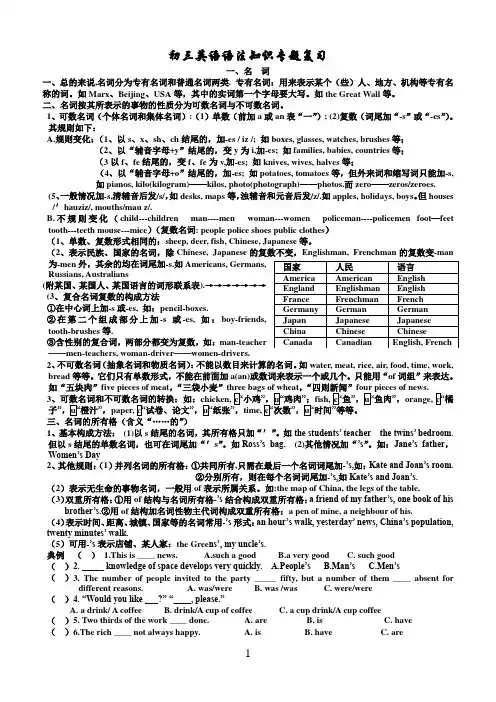
初三英语语法知识专题复习一、名 词一、总的来说,名词分为专有名词和普通名词两类. 专有名词:用来表示某个(些)人、地方、机构等专有名称的词。
如Marx 、Beijing 、USA 等,其中的实词第一个字母要大写。
如the Great Wall 等。
二、名词按其所表示的事物的性质分为可数名词与不可数名词。
1、可数名词(个体名词和集体名词):(1)单数(前加a 或an 表“一”); (2)复数(词尾加“-s ”或“-es ”)。
其规则如下:A.规则变化:(1、以s 、x 、sh 、ch 结尾的,加-es / iz /; 如boxes, glasses, watches, brushes 等;(2、以“辅音字母+y ”结尾的,变y 为i,加-es; 如families, babies, countries 等;(3以f 、fe 结尾的,变f 、fe 为v,加-es; 如knives, wives, halves 等;(4、以“辅音字母+o ”结尾的,加-es; 如potatoes, tomatoes 等,但外来词和缩写词只能加-s,如pianos, kilo(kilogram)——kilos, photo(photograph)——photos.而zero ——zeros/zeroes.(5、一般情况加-s,清辅音后发/s/,如desks, maps 等,浊辅音和元音后发/z/.如apples, holidays, boys 。
但houses /′hauziz/, mouths/mau z/.B.不规则变化(child---children man----men woman---women policeman----policemen foot —feet tooth---teeth mouse---mice )(复数名词: people police shoes public clothes )(1、单数、复数形式相同的:sheep, deer, fish, Chinese, Japanese 等。
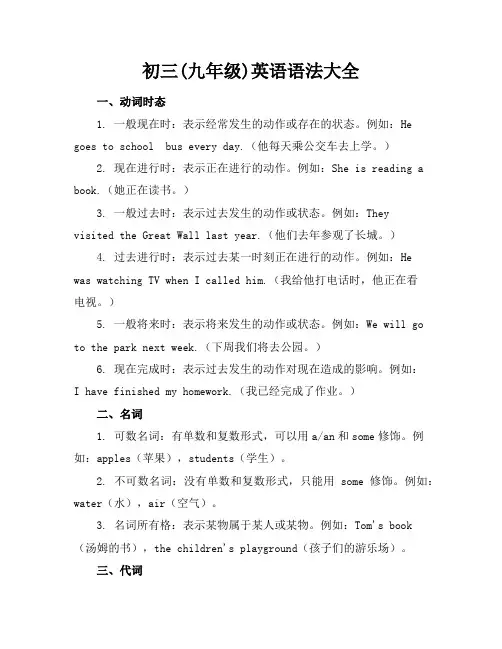
初三(九年级)英语语法大全一、动词时态1. 一般现在时:表示经常发生的动作或存在的状态。
例如:He goes to school bus every day.(他每天乘公交车去上学。
)2. 现在进行时:表示正在进行的动作。
例如:She is reading a book.(她正在读书。
)3. 一般过去时:表示过去发生的动作或状态。
例如:Theyvisited the Great Wall last year.(他们去年参观了长城。
)4. 过去进行时:表示过去某一时刻正在进行的动作。
例如:He was watching TV when I called him.(我给他打电话时,他正在看电视。
)5. 一般将来时:表示将来发生的动作或状态。
例如:We will go to the park next week.(下周我们将去公园。
)6. 现在完成时:表示过去发生的动作对现在造成的影响。
例如:I have finished my homework.(我已经完成了作业。
)二、名词1. 可数名词:有单数和复数形式,可以用a/an和some修饰。
例如:apples(苹果),students(学生)。
2. 不可数名词:没有单数和复数形式,只能用some修饰。
例如:water(水),air(空气)。
3. 名词所有格:表示某物属于某人或某物。
例如:Tom's book(汤姆的书),the children's playground(孩子们的游乐场)。
三、代词1. 人称代词:I(我),you(你/你们),he(他),she(她),it(它),we(我们),they(他们)。
2. 物主代词:my(我的),your(你的/你们的),his(他的),her(她的),its(它的),our(我们的),their(他们的)。
3. 指示代词:this(这个),that(那个),these(这些),those(那些)。

初三英语中考重点语法:一、时态1.一般现在时-用法:表示经常发生的动作或存在的状态;表示客观事实、真理等。
-标志词:always, usually, often, sometimes, every day/week/month/year 等。
-结构:主语+动词原形(当主语为第三人称单数时,动词用第三人称单数形式)。
2.一般过去时-用法:表示过去某个时间发生的动作或存在的状态。
-标志词:yesterday, last week/month/year, ago, in +过去的年份等。
-结构:主语+动词的过去式。
3.一般将来时-用法:表示将来某个时间要发生的动作或存在的状态。
-标志词:tomorrow, next week/month/year, in the future 等。
-结构:will +动词原形;be going to +动词原形。
4.现在进行时-用法:表示现在正在进行的动作。
-标志词:now, at the moment, look, listen 等。
-结构:be +动词的现在分词。
5.过去进行时-用法:表示过去某个时刻正在进行的动作。
-标志词:at that time, at +过去的时间点等。
-结构:was/were +动词的现在分词。
6.现在完成时-用法:表示过去发生的动作对现在造成的影响或结果;表示从过去一直持续到现在的动作或状态。
-标志词:already, yet, just, ever, never, since +时间点,for +时间段等。
-结构:have/has +动词的过去分词。
二、被动语态1.一般现在时的被动语态:am/is/are +过去分词。
2.一般过去时的被动语态:was/were +过去分词。
3.一般将来时的被动语态:will be +过去分词;be going to be +过去分词。
4.现在完成时的被动语态:have/has been +过去分词。
三、宾语从句1.引导词:that(在口语或非正式文体中可省略),if/whether(是否),特殊疑问词(what, who, when, where, why, how 等)。

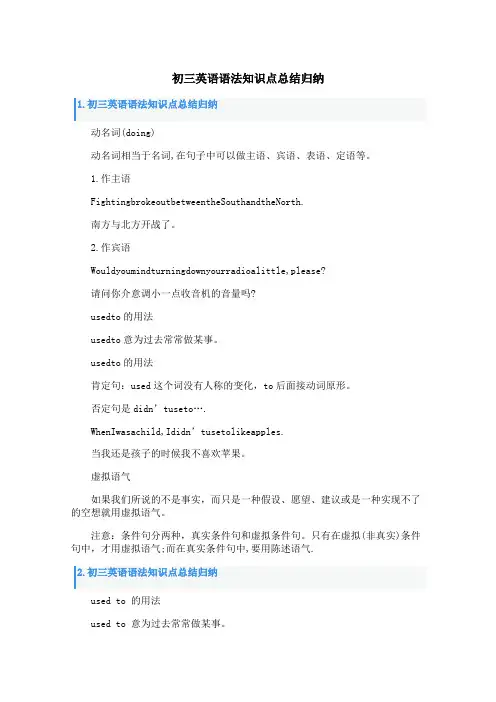
初三英语语法知识点总结归纳1.初三英语语法知识点总结归纳动名词(doing)动名词相当于名词,在句子中可以做主语、宾语、表语、定语等。
1.作主语FightingbrokeoutbetweentheSouthandtheNorth.南方与北方开战了。
2.作宾语Wouldyoumindturningdownyourradioalittle,please?请问你介意调小一点收音机的音量吗?usedto的用法usedto意为过去常常做某事。
usedto的用法肯定句:used这个词没有人称的变化,to后面接动词原形。
否定句是didn’tuseto….WhenIwasachild,Ididn’tusetolikeapples.当我还是孩子的时候我不喜欢苹果。
虚拟语气如果我们所说的不是事实,而只是一种假设、愿望、建议或是一种实现不了的空想就用虚拟语气。
注意:条件句分两种,真实条件句和虚拟条件句。
只有在虚拟(非真实)条件句中,才用虚拟语气;而在真实条件句中,要用陈述语气.2.初三英语语法知识点总结归纳used to 的用法used to 意为过去常常做某事。
used to 的用法1. 肯定句:used这个词没有人称的变化,to后面接动词原形。
否定句是didn’t use to….When I was a child, I didn’t use to like apples.当我还是孩子的时候我不喜欢苹果。
疑问形式是Did you use to…?Where did you use to live before you came here?当你来这儿之前你住哪儿?2. 含有used to 的句子的反意疑问句不要usedn’t + 主语,而用didn’t + 主语。
——He used to smoke, didn’t he?——他过去常常吸烟,是吗?Yes, he did./ No, he didn’t.是的,他吸。
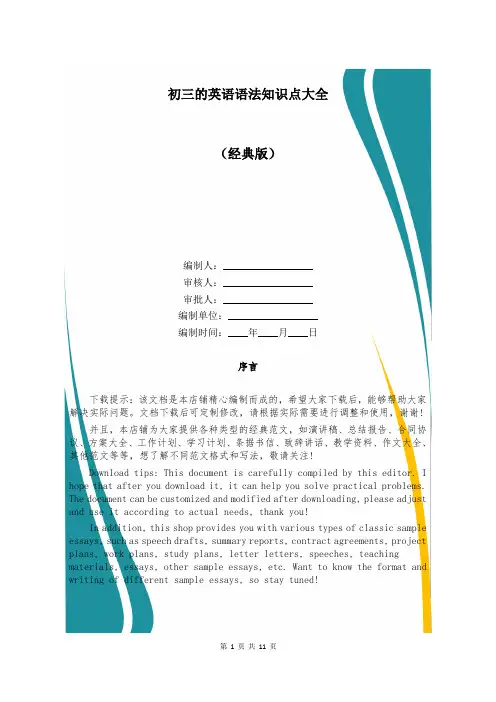
初三的英语语法知识点大全(经典版)编制人:__________________审核人:__________________审批人:__________________编制单位:__________________编制时间:____年____月____日序言下载提示:该文档是本店铺精心编制而成的,希望大家下载后,能够帮助大家解决实际问题。
文档下载后可定制修改,请根据实际需要进行调整和使用,谢谢!并且,本店铺为大家提供各种类型的经典范文,如演讲稿、总结报告、合同协议、方案大全、工作计划、学习计划、条据书信、致辞讲话、教学资料、作文大全、其他范文等等,想了解不同范文格式和写法,敬请关注!Download tips: This document is carefully compiled by this editor. I hope that after you download it, it can help you solve practical problems. The document can be customized and modified after downloading, please adjust and use it according to actual needs, thank you!In addition, this shop provides you with various types of classic sample essays, such as speech drafts, summary reports, contract agreements, project plans, work plans, study plans, letter letters, speeches, teaching materials, essays, other sample essays, etc. Want to know the format and writing of different sample essays, so stay tuned!初三的英语语法知识点大全许多英语学习者在实践中积累了丰富的经验,探讨了很多有效的方法。
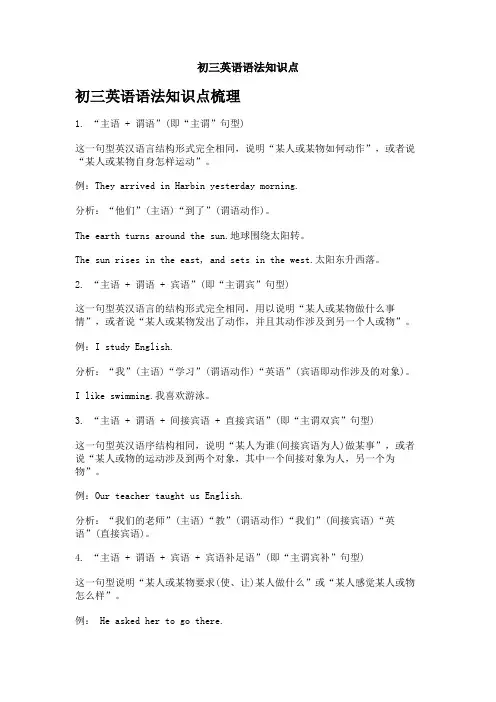
初三英语语法知识点初三英语语法知识点梳理1. “主语 + 谓语”(即“主谓”句型)这一句型英汉语言结构形式完全相同,说明“某人或某物如何动作”,或者说“某人或某物自身怎样运动”。
例:They arrived in Harbin yesterday morning.分析:“他们”(主语)“到了”(谓语动作)。
The earth turns around the sun.地球围绕太阳转。
The sun rises in the east, and sets in the west.太阳东升西落。
2. “主语 + 谓语 + 宾语”(即“主谓宾”句型)这一句型英汉语言的结构形式完全相同,用以说明“某人或某物做什么事情”,或者说“某人或某物发出了动作,并且其动作涉及到另一个人或物”。
例:I study English.分析:“我”(主语)“学习”(谓语动作)“英语”(宾语即动作涉及的对象)。
I like swimming.我喜欢游泳。
3. “主语 + 谓语 + 间接宾语 + 直接宾语”(即“主谓双宾”句型)这一句型英汉语序结构相同,说明“某人为谁(间接宾语为人)做某事”,或者说“某人或物的运动涉及到两个对象,其中一个间接对象为人,另一个为物”。
例:Our teacher taught us English.分析:“我们的老师”(主语)“教”(谓语动作)“我们”(间接宾语)“英语”(直接宾语)。
4. “主语 + 谓语 + 宾语 + 宾语补足语”(即“主谓宾补”句型)这一句型说明“某人或某物要求(使、让)某人做什么”或“某人感觉某人或物怎么样”。
例: He asked her to go there.分析:“他”(主语)“要求”(谓语动作)“她”(宾语即动作涉及的对象)“去那里”(补语—补充说明宾语应做什么)。
5. “主语 + have + 宾语”(即“拥有”句型)这一句型主要用于说明“某人或某物拥有什么(宾语,即有形或无形的资源)”。
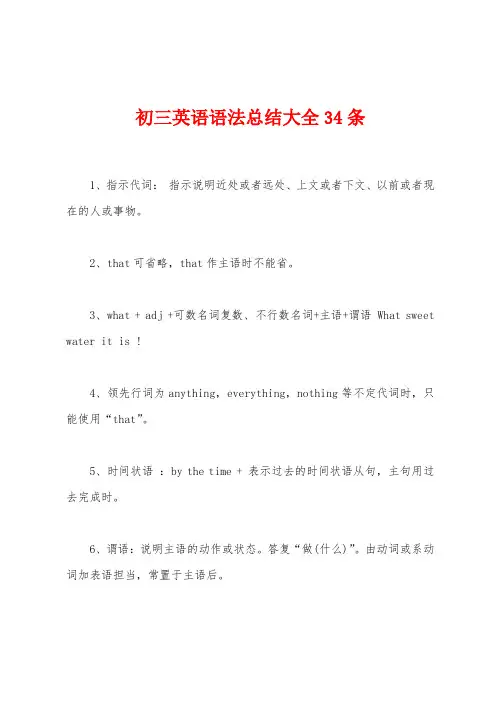
初三英语语法总结大全34条1、指示代词:指示说明近处或者远处、上文或者下文、以前或者现在的人或事物。
2、that可省略,that作主语时不能省。
3、what + adj +可数名词复数、不行数名词+主语+谓语 What sweet water it is !4、领先行词为anything,everything,nothing等不定代词时,只能使用“that”。
5、时间状语:by the time + 表示过去的时间状语从句,主句用过去完成时。
6、谓语:说明主语的动作或状态。
答复“做(什么)”。
由动词或系动词加表语担当,常置于主语后。
7、表语:用以表述主语的特征、状态、身份等。
答复是“什么”或者“怎么样”。
一般由名词或形容词担当,置于系动词或be动词之后。
8、几个用定冠词的习语:at the same time (与此同时),make the bed(铺床),in the end(最终),all the time(始终),by the way(顺便说一下),on the way(在路上)等等。
9、副词→连词,如:when(什么时候)→(当……时候),等等。
10、表感官的动词: feel, smell, taste, sound, look, appear, seem 等。
11、假如主句用现在的某个时态,宾语从句视实际状况而定。
12、专出名词是个别的人、地、物、团体、机构等的专用名称。
13、物主代词:说明事物所属关系的代词,分为形容词性和名词性两种。
14、英语可数名词的单复数:英语可数名词有单数和复数两种形式。
15、先行词被the only,the very,the same,the last修饰时,只能使用“that”。
16、合成法:如:spaceship, headache, basketball, playground 等等。
17、不定代词:代替或修饰不特指的人或事物的代词叫不定代词。
18、百位与十位之间要加and;十万位和万位,亿位和千万位之间通常也要加and。
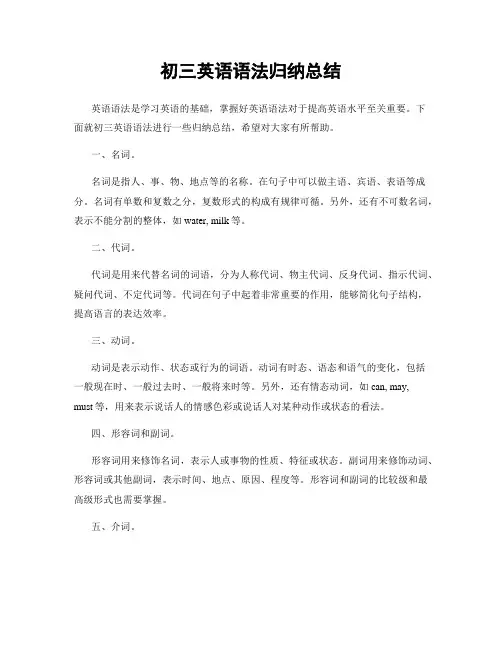
初三英语语法归纳总结英语语法是学习英语的基础,掌握好英语语法对于提高英语水平至关重要。
下面就初三英语语法进行一些归纳总结,希望对大家有所帮助。
一、名词。
名词是指人、事、物、地点等的名称。
在句子中可以做主语、宾语、表语等成分。
名词有单数和复数之分,复数形式的构成有规律可循。
另外,还有不可数名词,表示不能分割的整体,如water, milk等。
二、代词。
代词是用来代替名词的词语,分为人称代词、物主代词、反身代词、指示代词、疑问代词、不定代词等。
代词在句子中起着非常重要的作用,能够简化句子结构,提高语言的表达效率。
三、动词。
动词是表示动作、状态或行为的词语。
动词有时态、语态和语气的变化,包括一般现在时、一般过去时、一般将来时等。
另外,还有情态动词,如can, may, must等,用来表示说话人的情感色彩或说话人对某种动作或状态的看法。
四、形容词和副词。
形容词用来修饰名词,表示人或事物的性质、特征或状态。
副词用来修饰动词、形容词或其他副词,表示时间、地点、原因、程度等。
形容词和副词的比较级和最高级形式也需要掌握。
五、介词。
介词用来表示名词或代词与其他词之间的关系,常用的介词有in, on, at, with, to, for等。
介词短语在句子中起着非常重要的连接作用,能够使句子更加连贯和丰富。
六、连词。
连词用来连接词、短语或句子,使句子结构更加完整。
常见的连词有and, but, or, so, because等。
掌握好连词的用法能够帮助我们更好地表达自己的意思。
七、冠词。
冠词是用来限定名词的词语,包括定冠词和不定冠词。
定冠词包括the,不定冠词包括a和an。
冠词在句子中的位置和用法需要我们仔细加以区分和掌握。
总结起来,初三英语语法的归纳总结包括名词、代词、动词、形容词和副词、介词、连词和冠词等方面的内容。
只有对这些基础知识有一个清晰的认识和掌握,才能够在英语学习中更上一层楼。
希望大家能够认真学习和掌握这些内容,提高自己的英语水平。
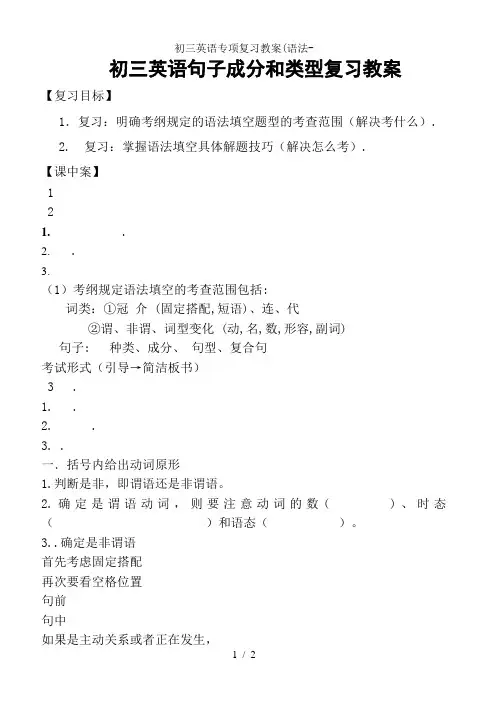
初三英语句子成分和类型复习教案
【复习目标】
1.复习:明确考纲规定的语法填空题型的考查范围(解决考什么).
2. 复习:掌握语法填空具体解题技巧(解决怎么考).
【课中案】
1
2
1. .
2. .
3.
(1)考纲规定语法填空的考查范围包括:
词类:①冠介 (固定搭配,短语)、连、代
②谓、非谓、词型变化 (动,名,数,形容,副词)
句子: 种类、成分、句型、复合句
考试形式(引导→简洁板书)
3 .
1. .
2. .
3. .
一.括号内给出动词原形
1.判断是非,即谓语还是非谓语。
2.确定是谓语动词,则要注意动词的数( )、时态()和语态()。
3..确定是非谓语
首先考虑固定搭配
再次要看空格位置
句前
句中
如果是主动关系或者正在发生,
如果是被动关系或者已经完成,
如果表示将来或目的,
二、名词
名词考察
以与句子意思,小心句意。
三、形容词&副词
若判断出空格内应填形容词或副词,要根据上下文语境确定用原级、比较级还是最高级形式。
形容词修饰副词修饰
+ ( )
, , a , a +
在句首若有词给出,一般填,注意句意
4
.
四、复习检测
见高分计划高分专练
【教学反思】。
《初三英语必备语法知识点》英语作为一门重要的学科,在初中阶段的学习中起着关键作用。
对于初三学生来说,掌握必备的语法知识点是提高英语成绩的重要途径。
本文将详细介绍初三英语必备的语法知识点,帮助同学们更好地应对中考。
一、名词1. 名词的分类名词可分为可数名词和不可数名词。
可数名词有单数和复数形式,不可数名词没有复数形式。
例如:book(可数名词单数)、books(可数名词复数)、water(不可数名词)。
2. 名词的所有格表示所属关系时,用名词的所有格。
一般在名词后加“'s”,以 s 结尾的复数名词加“'”。
例如:Tom's book(汤姆的书)、teachers' office(教师办公室)。
二、代词1. 人称代词人称代词分为主格和宾格。
主格在句子中作主语,宾格在句子中作宾语。
例如:I(主格)、me(宾格);he(主格)、him(宾格)。
2. 物主代词物主代词分为形容词性物主代词和名词性物主代词。
形容词性物主代词后面必须跟名词,名词性物主代词后面不能跟名词。
例如:my book(我的书),mine = my book。
3. 指示代词this(这个)、that(那个)、these(这些)、those(那些)。
this 和 that 是单数,these 和 those 是复数。
三、数词1. 基数词和序数词基数词表示数量,序数词表示顺序。
例如:one(基数词)、first(序数词)。
2. 分数的表达分子用基数词,分母用序数词。
当分子大于一时,分母要用复数形式。
例如:1/3 one third;2/5 two fifths。
四、冠词1. 不定冠词 a/ana 用于辅音音素开头的单词前,an 用于元音音素开头的单词前。
例如:a book、an apple。
2. 定冠词 the表示特指的人或事物,也可用于上文提到过的人或事物前。
例如:The book on the desk is mine.(桌子上的书是我的。
初三英语重点语法总结初三英语重点语法总结一、动词时态和语态1. 一般现在时:表示经常性、习惯性的动作或真理。
结构:主语 + 动词原形Eg. She usually goes to school by bus.2. 一般过去时:表示过去某个时间发生的动作或存在的状态。
结构:主语 + 动词过去式Eg. They watched a movie last night.3. 现在进行时:表示现在正在进行的动作。
结构:主语 + be动词(am/is/are) + 动词-ing形式Eg. She is reading a book now.4. 过去进行时:表示过去某个时间正在进行的动作。
结构:主语 + 过去式be动词(was/were) + 动词-ing形式Eg. They were playing football yesterday afternoon.5. 现在完成时:表示过去某个时间开始一直延续到现在的动作或已完成的动作。
结构:主语 + have/has + 过去分词Eg. We have finished our homework.6. 过去完成时:表示过去某个时间或动作发生在另一个过去的时间或动作之前。
结构:主语 + had + 过去分词Eg. He had already left when I arrived.7. 将来时:表示将来某个时间要发生的动作或存在的状态。
结构:主语 + will/shall + 动词原形Eg. They will go hiking next weekend.8. 过去将来时:表示过去某个时间本来可以实现的行动或状态。
结构:主语 + should/would + 动词原形Eg. He said he would help me with my homework.9. 被动语态:表示动作的承受者是主语,动作的执行者不重要或未知。
结构:主语 + be动词 + 过去分词Eg. The letter was written by him.二、名词1. 可数名词:可以用数目词来修饰和计数的名词。
初三英语语法总结归纳在初三英语学习中,语法是一个非常重要的部分。
正确的语法运用可以帮助我们更准确、更流利地表达自己的意思。
下面是对初三英语常用语法知识的总结归纳。
1. 词性英语单词有不同的词性,包括名词(noun)、动词(verb)、形容词(adjective)、副词(adverb)等。
了解不同词性可以帮助我们正确使用单词。
名词:名词用来表示人、物、地点等具体或抽象的事物。
名词通常有单数和复数形式。
动词:动词用来表示行为、状态、存在等。
动词可以根据时态的不同分为现在时、过去时和将来时等。
形容词:形容词用来描述名词的特征或性质。
形容词通常在名词前面。
副词:副词用来修饰动词、形容词或其他副词,表示时间、地点、方式等。
2. 句子结构英语句子的基本结构包括主语、谓语和宾语。
主语:句子的主要内容,通常是名词或代词。
谓语:句子的核心,表达主语的动作或状态,通常是动词。
宾语:句子中受动作影响的人或物,通常是名词或代词。
3. 时态时态是指动词所表示的动作或状态所发生的时间。
在英语中,常用的时态包括现在时态、过去时态和将来时态。
现在时态:表示现在正在进行的动作或普遍性的真理。
过去时态:表示过去发生的动作或状态。
将来时态:表示将来将要发生的动作或状态。
4. 从句从句是一个句子结构,它包含一个主句和一个从句。
从句可以充当名词、形容词或副词。
名词从句:从句在句子中作为主语、宾语等成分。
形容词从句:从句在句子中修饰名词。
副词从句:从句在句子中修饰动词、形容词或副词。
5. 语态英语中的动词可以用不同的语态来表示句子的结构和意义。
常见的语态有主动语态和被动语态。
主动语态:表示主语是动作的执行者。
被动语态:表示主语是动作的承受者。
6. 语气语气是指句子所表达的情态或态度。
常见的语气有陈述语气、疑问语气、祈使语气和感叹语气。
陈述语气:用于陈述事实或提出观点。
疑问语气:用于提问。
祈使语气:用于表示请求或命令。
感叹语气:用于表达惊讶、喜悦、遗憾等感叹的情绪。
初三英语语法知识点总结归纳初三英语的语法知识点是英语学习的基础,以下是一些常见的初三英语语法知识点的总结和归纳:1. 动词时态:-一般现在时:用于表达习惯、常规或普遍事实。
-现在进行时:表示当前正在进行的动作。
-一般过去时:用于过去发生的动作或状态。
-过去进行时:表示过去某一时刻正在进行的动作。
-将来时:用于表示将来发生的动作或计划。
2. 情态动词:如can、could、may、might、will、would、shall、should、must等,用于表示能力、许可、建议、义务等情态。
3. 被动语态:用于强调动作的承受者,构成为“be + 过去分词”。
4. 条件句:-第一条件句(真实条件句):表示可能实现的条件和结果。
-第二条件句(虚拟条件句):表示不太可能实现的条件和结果。
-第三条件句(虚拟条件句):表示过去无法实现的条件和结果。
5. 定语从句:用于修饰名词的从句,关系代词包括who、which、whose、whom、that等。
6. 副词从句:用于修饰动词、形容词或副词的从句,常用引导词包括when、where、why、if、because等。
7. 名词性从句:从句在句中充当名词的角色,如主语从句、宾语从句、表语从句。
8. 形容词和副词比较级:用于表示比较程度,比如用more和most表示形容词和副词的比较级。
9. 直接和间接引语:用于引述别人的话,直接引语中使用引号,间接引语中改变时态和人称。
10. 冠词:不定冠词(a/an)用于泛指,定冠词(the)用于特指,零冠词用于泛指或抽象名词。
11. 可数名词和不可数名词:可数名词可以单数和复数形式,不可数名词没有复数形式,表示不可分割的东西。
12. 形容词和名词的性数一致:形容词与名词在性别和数上要一致,如单数男性名词配合男性形容词。
13. 反身代词:用于表示某人做某事而影响到自己的代词,如myself、yourself、himself、herself、itself、ourselves、yourselves、themselves。
初三英语语法知识点总结归纳(优秀8篇)初三的英语学习是单词和语法的综合,你必须要把单词和语法一起拿下,考试的时候才能获得一个好分数。
这次帅气的为您整理了8篇《初三英语语法知识点总结归纳》,希望可以启发、帮助到大朋友、小朋友们。
初三英语语法知识点总结归纳篇一被动语态1.英语中动词有两种语态:主动语态和被动语态主动语态表示主语是谓语动词动作的执行者,被动语态表示主语是谓语动词动作的承受者。
当我们强调谁是某个动作的执行者,即"谁做了某种事情"时,用主动语态。
eg:Danielboughtanewputer丹尼尔买了一台新电脑。
(不是别人)如果主语不是动作的执行者,而是动作的承受者时,就是被动语态。
eg:AnewputerwasboughtbyDaniel一台新电脑被丹尼尔买了。
被动语态的谓语由be+动词的过去分词构成,其中be是助动词,随时态改变。
一般现在时的被动语态由"am/is/are+动词的过去分词"构成。
一般过去时的被动语态由"was/were+动词的过去分词"构成。
最新九年级英语语法知识点总结大全篇二语法:直接引语变间接引语。
直接引用别人的话叫直接引语,用来转述别人的话叫间接引语。
例:Hesaid,HewillgotoBeijingtomorrow.(直接引语)HesaidthathewouldgotoBeijingthenextday.直接引语变间接引语时时态、人称及一些时间或个别词都要做相应的改变。
①时态:一般现在时→一般过去时一般将来时→过去将来时现在进行时→过去进行时一般过去时→过去完成时现在完成时→过去完成时_真理性的句子时态不变。
例:Hesaid:Thesunrisesintheeast.Hesaidthatthesunrisesintheeast.他说太阳从东方升起。
②时间:now→then,lastmonth→themonthbefore.today→thatday,threedaysago→threedaysbefore.tonight→thatnight,tomorrow→thenextday.yesterday→thedaybefore,thedayaftertomorrow→intwodays.③其它变化:this→thatthese→thosehere→theree→go句式的改变:①直接引语是陈述句加that可以省去。
初三的英语语法知识点总结归纳英语作为一门重要的学科,语法是其基础和核心内容。
在初三阶段,学生需要全面掌握英语语法知识,以便正确运用语言表达自己的思想和理解他人的意思。
本文将对初三英语语法知识点进行总结归纳,帮助同学们快速复习和强化记忆。
一、词类与词性1. 名词(Noun):表示人、物、地点、抽象概念等。
2. 代词(Pronoun):代替名词,分为人称代词、物主代词、反身代词等。
3. 形容词(Adjective):修饰名词或代词,描述属性或特征。
4. 副词(Adverb):修饰动词、形容词和其他副词,表示程度、方式、时间等。
5. 动词(Verb):表示动作、状态或存在。
6. 介词(Preposition):表示位置、方向、时间、关系等。
7. 连词(Conjunction):连接词语、短语、从句等。
8. 冠词(Article):限定名词的用法,分为不定冠词(a/an)和定冠词(the)。
二、句子结构与语法规则1. 陈述句(Declarative Sentence):陈述一个事实或观点,语序为主语+谓语+宾语/补语。
2. 疑问句(Interrogative Sentence):用于提问,语序为助动词/特殊疑问词+主语+谓语+宾语/补语。
3. 祈使句(Imperative Sentence):表达命令、请求、建议等,语序为谓语+宾语/补语。
4. 感叹句(Exclamatory Sentence):表达强烈的感情或意见,语序为"What/how+adj./adv.!"。
5. 主谓一致:主语与谓语之间在人称、数上保持一致。
6. 定语从句(Adjective Clause):用来修饰名词或代词的从句,引导词有关系代词和关系副词。
7. 状语从句(Adverbial Clause):修饰动词、形容词和副词的从句,包括时间、地点、条件、原因等。
三、时态与语态1. 一般现在时(Simple Present):表示经常性、习惯性或普遍真理,动词原形。
遂宁太学培训学校内部资料-中考英语语法复习姓名中考英语语法讲解一.时态1.主要动词时态的构成英语中的时态共有16种,但是中考常考的或较常用的有8种。
见下表:主要时态讲解(一)一般现在时1.表示经常或习惯性的动作,多用行为动词,且常与表频率的时间状语连用We always care for each other and help each other.2.表示客观事实或普遍真理(不受主句时态的限制)The geography teacher told us the earth moves around the sun.重点1.表示一个按规定、计划或安排要发生的动作,只用一般现在时;The plane takes off at 10:00 a.m.飞机上午10点起飞。
2.在时间、条件状语从句中常用一般现在时代替将来时。
但要注意由if 引导的条件状语从句中有时可以用shall或will表“意愿”,不表示时态;I’ll go there after I finish my work.If you will accept my invitation and come to our party, my family will be pleased.3.以here, there开头的句子里,go, come等少数动词的一般在时表示正在发生的动作。
There comes the bus.汽车来了。
(二)一般过去时基本用法1.过去某一时间内经常发生或反复发生的动作或存在的状态He lived in Beijing when he was young.他年轻时生活在北京。
2.表达过去发生的动作We visited the factory last Friday.上周五我们参观了那家工厂。
重点点击1.有些动词如:think, want, plan等用在一般过去时中常常译为“原来认为/以为,原来想,原计划”。
I thought the film would be interesting, but it isn't.我原以为这部电影是很有趣的,但是事实并非如此。
2.考生有时用现在完成时代替一般过去时Hello, I _______you were in London. How long _________here?A. don’t know; were youB. hadn’t known; are youC. haven’t known; areD. didn’t know; have you been(三)一般将来时基本用法1.表示将来的动作和存在的状态The first time we’ll send you with an experienced reporter.第一次我们要派有经验的记者陪同你一起去。
2.表示一种倾向或习惯性动作Oil will float on water.油会浮在水面上。
Crops will die without water.没有水庄稼会死亡重点一般将来时几种特殊表达形式的区别1.be going to:表示打算做某事或有迹象表明即将发生某事I am going to visit my friend in hospital.我将去看望住在医院的朋友。
It looks as if it is going to rain.看起来好象要下雨了。
2.be about to:表示即时的将来。
一般不与时间状语连用N ow ladies and gentleman, you’re about to hear the most incredible tale.女士们,先生们,你们马上就要听到一个难以置信的故事。
3.be to:可用来表示计划、安排(通常是正式的安排);指令;(表示可能)会做……,可能;必定会发生或已发生了某事;发布命令或告之规则Their daughter is to get married soon.他们的女儿可能不久就要结婚了。
(四)现在进行时基本用法1.表示现在正在进行的动作;It is raining heavily now, so we must stay inside.现在正下着大雨,因此我们必须呆在家里。
2.表示按计划安排即将发生的动作;My father is coming to see me this Saturday.这个星期六我爸爸要来看我。
重点现在进行时与always, often等频度副词连用,表经常反复的行动或某种感情色彩Why are always forgetting his name?为啥你总是记他的名字呢?(五)过去进行时基本用法1.表示按计划安排即将发生的动作My father is coming to see me this Saturday.这个星期六我爸爸要来看我。
2.表示过去某一时刻或某一段时间内正在进行的动作(这一过去时间须用时间状语表示)He was preparing his lecture all day yesterday.昨天一整天他都在准备他的演讲。
3.用在两个过去进行时动作同时发生I was writing while he was watching TV. 我在写东西而他在看电视。
4.表示过去将来动作He said she was arriving the next.day.他说他将在第二天到达。
重点考生有时用现在完成时或用一般过去时代替过去进行时。
He ______a book about China last year, but I don’t know if he _____it.A. wrote; has finishedB. was writing; has finishedC. was writing; had finishedD. wrote; will finish(六)将来进行时基本用法1.表示将来某一时间正在进行的动作,一般带状语When he comes to my house tomorrow, I will be writing the report.他明天来我家的时候,我将正在写报告。
2.表示现在正在进行的动作,但这个动作会延续到将来I think that she will be working on this experiment until next morning.我想她做这个实验将会一直做到明天早上。
3.表示预定的将来动作或对将来的预测Stop the child or he will be falling over.拦住那孩子,不然他会摔下去的。
重点将来进行时和一般将来时的区别1.一般将来时不仅表示“将来”,还含有“意志、意愿”等的意思I’ll try my best to hard work at English.我将尽全力努力学习英语。
(含意愿的意思)I’ll be studying English next term.下学期我将学习英语。
(表示单纯的将来)2.跟一般将来时连用的时间状语比较模糊,而跟进来进行时连用的时间状语非常具体I’ll write a letter to my father tomorrow.我明天要给父亲写信。
I’ll be writing a letter to my father this time tomorrow.明天这个时候,我会给父亲写信的。
(七)现在完成时基本用法表示过去发生的动作对现在产生的影响或结果,说话时已完成的动作。
I have finished the report. 我已经完成了这个报告。
She has cleaned the room.她已经打扫干净了这个房间。
重点1.表示从过去开始,持续到现在的动作或状态,往往和“for...”,“since...”表述的一段时间状语连用。
He has learned English for six years.他学英语已经六年了。
They have worked here since they left college.他们大学毕业以后就在这里工作。
2.表示“曾经到过某地(人已回来)”用“have/has been to”,表示“到某地去了(还未回来)”用“have/has gone to”。
—Where is Li Hua?—李华在哪里?-He has gone to the reading-room.—She knows a lot about Shanghai.—关于上海,她懂很多。
-She has been there.短暂动词(即瞬间动词),如:join,lose,buy,borrow,leave,go,come,arrive,die,marry,finish,complete,begin,start, break out等,在完成时态中,其肯定式不能和表示一段时间的状语连用。
翻译“他已参军已经三年了”。
(八)过去完成时基本用法表示在过去某一时间以前已经完成的动作。
He had shut the door before the dog came up.在那狗走过来之前,他已将门关上了。
Everything had been all right up till this morning.直到今天上午为止,一切都正常。
重点1.表示动作或状态从过去某个时刻开始一直延续到另一个过去时刻才完成,甚至还要继续下去。
At the age of ten, he had learned 500 English words.十岁的时候,他已经学了500个英语单词了。
He had been ill for a week when we learned about it.我们知道的时候,他已经病了一个星期了。
2.常用hope, expect, think, intend, want, suppose等动词的过去完成时来表示未实现的希望、打算或意图。
We had expected that you would be able to win the match.我们本期望你能赢得这场比赛的。
时态综合训练I、选择填空()1. It ______ 3 years since he left us.A. isB. has beenC. wasD. were( ) 2. 15 years ________ since I became a teacher.A. passedB. has pastC. have passedD. has passed( )3. They told us that they ________ three hundred trees by the time the workers got there.A. have plantedB. plantedC. had plantedD. were planting( )4. My daughter won’t go to sl eep until I _______ back.A. goB. goesC. have goneD. will go( )5. Kitty ________ games while I was cooking.A. playsB. was playingC. makeD. does( )6. What ______ they doing then on the hill?A. areB. wereC. isD. was( )7. He ________ his homework this time yesterday.A.does B. was doing C. is doing D. is( )8.The letter _______ a week ago and it______ yesterday.A. posted; arrivedB. was posted; arrivedC. is posted; arrivedD. has posted; has arrived( )9.They ________ friends since they met in Shanghai.A. have madeB. have becomeC. have beenD. have turned( )10. The workers __________ many toys in the factory last year.A. inventB. inventedC. inventionD. inventing( )11. Neither you nor he ________ New York city.A. has gone toB. have gone toC. have been toD. has been to( )12. By ten o’clock yesterday they _______ at the airport.A. had arrivedB. have arrivedC. shall arriveD. arrive( )13. I got up very late this morning. There _______ no time to have breakfast.A. hadB. hasC. wasD. is( )14. So far we ________ the moon.A. gets toB. arrivedC. have reachedD. have arrived( )15. I _______ for them at the school gate ______ it began to rain.A. didn’t wait, untilB. didn’t wait, whenC. waited, untilD. waited, because( )16. He said a new school _________ in two weeks.A. will be builtB. would be builtC. had builtD. was being built( )17. Two-thirds of the work __________ by the computer last week.A. are doneB. is doneC. were doneD. was done( )18. He ________ his bag in the library this morning.A. forgotB. lostC. had leftD. left( )19. My brother ______ while he _______ his bicycle and hurt himself.A. fell, was ridingB. fell, were ridingC. had fallen, rodeD. had fallen, was riding( )20. “ Did you catch the bus?” “No, when I ______ there, the bus ________.”A. gets, has leftB. got, leftC. got, had leftD. had got, left( )21. --- Sh e hasn’t washed the car, has she?--- No, she hasn’t. But she said she ______ it after supper.A. had washedB. washesC. will washD. was going to wash( )22. --- _____ will you finish writing the article?--- In two days.A. How longB. How soonC. How oftenD. How fast( )23. Someone _____ at he door when she was cooking in the kitchen.A. had knockedB. has knockedC. knockedD. was knocking( )24. ---- Where is Teddy now? --- He ____ his bike in the yard.A. fixes upB. fixing upC. is fixingD. fixed( )25. Noddy ________ a film if he’s free next Sunday.A. seeB. sawC. has seenD. will see( )26. The photo ________ nice.A. looksB. is lookedC. lookD. is looking( )27. Great changes ______ in Shenyang during the past ten years.A. have happenedB. have been happenedC. happenedD. was happened ( )28. The film _________ for five minutes.A. has beenB. has been onC. beganD. has begun( )29. Hurry! We _____ the train.A. will missB. missC. missedD. have missed( )30. Unless it ________tomorrow, I’ll go on foot.A. doesn’t rainB. rainsC. will rainD. won’t rain( )31. _____ Mr White ___ the doctor the day before yesterday?A. Does, seeB. Has, seenC. Will, seeD. Did, see( )32. I’ll visit my teacher when she ________.A. will returnB. returnC. returnsD. returned( )33. ---What were they talking about when you ______ them?--- About Yao Ming.A. seeB. had seenC. sawD. were seeing( )34.One of my classmates___ for England this Friday.Shall we go to see her off at the airport?A. are leavingB. is leftC. is leavingD. goes( )35. Be quiet! Your father ________.A. sleepsB. sleepingC. is thinkingD. was working.( )36. Everyone except Tom and Johnny ____ there when the meeting began.A. isB. wasC. areD. were( )37. What does the sentence “ Don’t trouble trouble till trouble _____ you.” mean?A. troubleB. troublesC. will troubleD. troubled( )38. ---I hear your father ____ to Japan once.---Yes, he_______ there last year.A. went, has beenB. has gone, wentC. has been, wentD. had gone, has been ( )39. ---Could you go to buy some salt for me? ---Sorry, mum. I ____ my homework.A. am doingB. doC. will finishD. have finished( )40. --- What ______ under the bed, Tim? --- Oh, Where ‘s my other sock, dad?A. do you doB. are you doingC. have you doneD. did you do二.语态1)主动语态:略2)被动语态1.被动语态的构成形式1. 被动语态的基本时态变化被动语态通常为十种时态的被动形式, 被动语态由be+过去分词构成,be随时态的变化而变化。